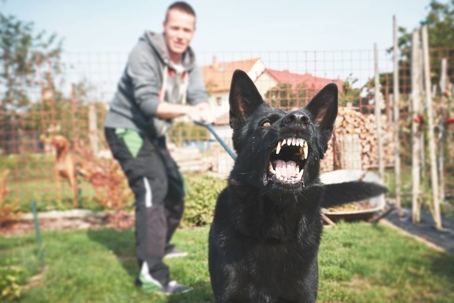Although dog bites can sometimes be minor and be resolved with basic first aid, a severe dog bite can be a traumatic and life-altering event. Especially if the dog is unfamiliar, it's crucial to know what steps to take in order to find proper treatment, prevent infection, and take legal action. In this post, we’ll cover seven steps to follow after a dog bite or attack.
1. Get the Responsible Party’s Contact Information
In the event of suffering from a dog bite, it's crucial to obtain the contact information of the person who is responsible for the dog. If possible, be sure to get the person’s name and phone number. By doing so, you can ensure that you have the necessary details to report the incident. ALSO, get the address where the dog lives (even if the attack did not happen at that property)—it will likely be the homeowner’s insurance policy on the property where the dog lives that will be asked to pay a resulting injury claim.
2. Wash the Wound
Dog bites can be painful and scary, but it's important to take immediate action to prevent further complications. If you've been bitten by a dog, the first step is to clean the wound as quickly as possible. Using mild soap (antibacterial soap) and warm water can help rinse away any bacteria or debris that may have been left behind. However, if the bite is more severe, call 911 immediately. If it does not seem emergent—still call your primary care physician to get medical advice on cleaning, care, symptoms to watch for and, perhaps, advice to seek urgent care.
3. Stop Bleeding
Once the area is cleaned, applying pressure with a clean cloth can help stop the bleeding. It's important to remember to use a clean cloth to avoid introducing bacteria into the wound. Keeping pressure on the wound can also help promote clotting to aid in the healing process.
4. Cover the Wound
If available, apply antibiotic ointment to the wound to help reduce the risk of infection. This can help to precent the growth of bacteria and keep your wound clean.
After applying antibiotic ointment, cover the wound with a clean dry bandage. This not only helps to keep the area clean, but it also reduces the risk of infection. If the bite is located on your arm or leg, be sure to wrap it as well. A wrapped bandage helps to further safeguard the wound from dirt, unwanted bacteria, and potential irritants.
5. Seek Medical Attention
It's important to act quickly when it comes to cleaning and treating a wound, but it's equally important to seek medical attention. While you may feel that your wound has been adequately cleaned and bandaged, a medical professional can thoroughly assess the extent of the injury and determine if any additional treatment is necessary. They can also check for signs of infection, which can be difficult for an inexperienced eye to spot. At the very least, call and discuss the bite with your doctor. It is preferable to actually seek in-person medical attention as it will allow for a medical professional to examine the wound, etc. The consultation and examination will also be important if you decide to pursue an injury claim.
You should seek medical attention if you experience the following:
- Large and/or deep dog bite wounds
- Injury to the head, neck, hands, feet, or genital area
- Continual bleeding
- Extreme pain
- Swelling or deformation
- Trouble moving joints, fingers, and/or toes
Seeking medical attention may seem like an inconvenience, but it's important for the safety and proper healing of your wound. Don't hesitate to schedule an appointment as soon as possible or visit an urgent care facility if needed. Infection can begin to show within 24 to 48 hours and may include the following symptoms:
- Fever
- Increased pain
- Redness
- Puss drainage
6. Document Information
After caring for any wound sustained from a dog encounter, it's important to keep track of the details. You should take pictures and videos of your wound, as well as write down information pertaining to the incident, including:
- Day and time of injury
- Location of injury
- Medical bills
- Text messages about the encounter
- Type of dog/owner if known
7. Contact a Dog Bite Attorney
If you've suffered a dog bite injury, the encounter can leave you with emotional and physical consequences. Not only can dog bites cause scarring and disfigurement, but they can also lead to time lost from work, extensive medical bills, and the need for ongoing rehabilitation.
In the most severe cases, dog attacks can even result in permanent disabilities that affect your quality of life. This is why it's crucial to work with a dog bite attorney who can help you take legal action and hold the responsible party accountable for your injuries. With the support of an experienced legal professional, you can find closure to your experience and move forward with peace of mind.
Our dog bite lawyer at Brett H. Oppenheimer, PLLC. has years of experience helping clients with his legal guidance and experience. Don’t go through this alone. Contact our office today at (502) 242-8877 or contact us online.

